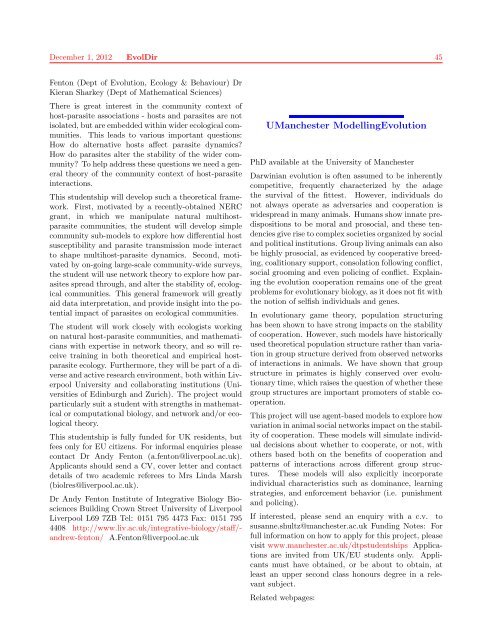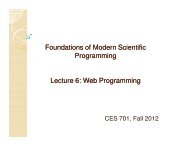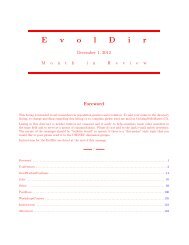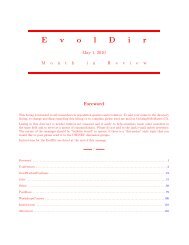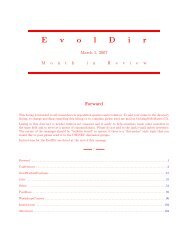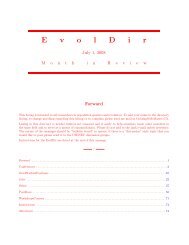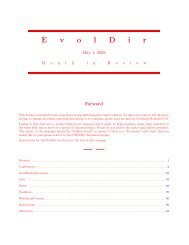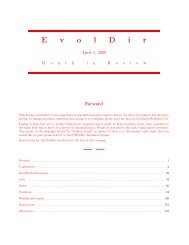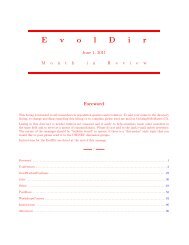E v o l D i r
E v o l D i r
E v o l D i r
Create successful ePaper yourself
Turn your PDF publications into a flip-book with our unique Google optimized e-Paper software.
December 1, 2012 EvolDir 45<br />
Fenton (Dept of Evolution, Ecology & Behaviour) Dr<br />
Kieran Sharkey (Dept of Mathematical Sciences)<br />
There is great interest in the community context of<br />
host-parasite associations - hosts and parasites are not<br />
isolated, but are embedded within wider ecological communities.<br />
This leads to various important questions:<br />
How do alternative hosts affect parasite dynamics?<br />
How do parasites alter the stability of the wider community?<br />
To help address these questions we need a general<br />
theory of the community context of host-parasite<br />
interactions.<br />
This studentship will develop such a theoretical framework.<br />
First, motivated by a recently-obtained NERC<br />
grant, in which we manipulate natural multihostparasite<br />
communities, the student will develop simple<br />
community sub-models to explore how differential host<br />
susceptibility and parasite transmission mode interact<br />
to shape multihost-parasite dynamics. Second, motivated<br />
by on-going large-scale community-wide surveys,<br />
the student will use network theory to explore how parasites<br />
spread through, and alter the stability of, ecological<br />
communities. This general framework will greatly<br />
aid data interpretation, and provide insight into the potential<br />
impact of parasites on ecological communities.<br />
The student will work closely with ecologists working<br />
on natural host-parasite communities, and mathematicians<br />
with expertise in network theory, and so will receive<br />
training in both theoretical and empirical hostparasite<br />
ecology. Furthermore, they will be part of a diverse<br />
and active research environment, both within Liverpool<br />
University and collaborating institutions (Universities<br />
of Edinburgh and Zurich). The project would<br />
particularly suit a student with strengths in mathematical<br />
or computational biology, and network and/or ecological<br />
theory.<br />
This studentship is fully funded for UK residents, but<br />
fees only for EU citizens. For informal enquiries please<br />
contact Dr Andy Fenton (a.fenton@liverpool.ac.uk).<br />
Applicants should send a CV, cover letter and contact<br />
details of two academic referees to Mrs Linda Marsh<br />
(biolres@liverpool.ac.uk).<br />
Dr Andy Fenton Institute of Integrative Biology Biosciences<br />
Building Crown Street University of Liverpool<br />
Liverpool L69 7ZB Tel: 0151 795 4473 Fax: 0151 795<br />
4408 http://www.liv.ac.uk/integrative-biology/staff/andrew-fenton/<br />
A.Fenton@liverpool.ac.uk<br />
UManchester ModellingEvolution<br />
PhD available at the University of Manchester<br />
Darwinian evolution is often assumed to be inherently<br />
competitive, frequently characterized by the adage<br />
the survival of the fittest. However, individuals do<br />
not always operate as adversaries and cooperation is<br />
widespread in many animals. Humans show innate predispositions<br />
to be moral and prosocial, and these tendencies<br />
give rise to complex societies organized by social<br />
and political institutions. Group living animals can also<br />
be highly prosocial, as evidenced by cooperative breeding,<br />
coalitionary support, consolation following conflict,<br />
social grooming and even policing of conflict. Explaining<br />
the evolution cooperation remains one of the great<br />
problems for evolutionary biology, as it does not fit with<br />
the notion of selfish individuals and genes.<br />
In evolutionary game theory, population structuring<br />
has been shown to have strong impacts on the stability<br />
of cooperation. However, such models have historically<br />
used theoretical population structure rather than variation<br />
in group structure derived from observed networks<br />
of interactions in animals. We have shown that group<br />
structure in primates is highly conserved over evolutionary<br />
time, which raises the question of whether these<br />
group structures are important promoters of stable cooperation.<br />
This project will use agent-based models to explore how<br />
variation in animal social networks impact on the stability<br />
of cooperation. These models will simulate individual<br />
decisions about whether to cooperate, or not, with<br />
others based both on the benefits of cooperation and<br />
patterns of interactions across different group structures.<br />
These models will also explicitly incorporate<br />
individual characteristics such as dominance, learning<br />
strategies, and enforcement behavior (i.e. punishment<br />
and policing).<br />
If interested, please send an enquiry with a c.v. to<br />
susanne.shultz@manchester.ac.uk Funding Notes: For<br />
full information on how to apply for this project, please<br />
visit www.manchester.ac.uk/dtpstudentships Applications<br />
are invited from UK/EU students only. Applicants<br />
must have obtained, or be about to obtain, at<br />
least an upper second class honours degree in a relevant<br />
subject.<br />
Related webpages:


